Business analytics has become the primary practice for managers and executives in making informed business decisions. It can benefit any industry and sector, ranging from restaurants to tech giants.
Unsurprisingly, there is a steep rise in demand for business analysts from all industries, making the career in this field more lucrative than ever. According to Ziprecruiter, those with business analytics jobs in the US earn as high as $98000 on average.
The great news is you don’t need to strive to get into the MBA program and spend hundreds of thousands of dollars in tuition to learn business analytics.
As the internet offers a vast range of learning resources on business analytics, you can master business analytics by taking top-rated courses. These courses are far more affordable but still provide a high-quality learning experience.
However, choosing a business analytics course from this wide array of options is an uphill task.
In this post, I have curated some of the best business analytics courses available online today. These courses will help you build your business analytics skills from the very beginning.
Affiliate Disclosure: This post from Victory Tale contains affiliate links. If you purchase business analytics courses through them, we will receive a small commission from course providers.
Nevertheless, we always value integrity and prioritize your audience’s interests. You can then rest assured that we will present each course truthfully.
1. Business Analytics Nanodegree Program
This nanodegree program from Udacity offers excellent, comprehensive business analytics training to learners.
Unlike other online platforms, Udacity provides bootcamp-like student support, which will enrich your learning experience significantly. You can then be sure that you will be able to put all your knowledge into use.
No background knowledge is necessary for this program.
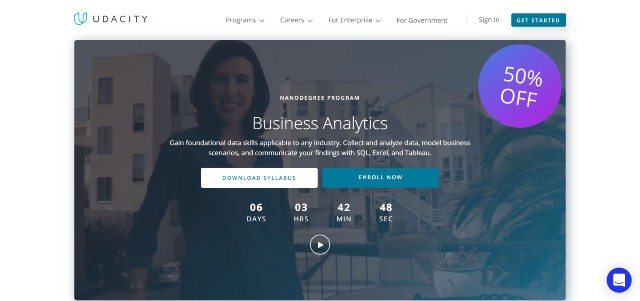
Course Content
Essentially, this program will equip you with foundational data skills that you can apply to any business, sector, or industry. Upon program completion, you will be comfortable utilizing business analytics in your career.
The program comprises four sections as follows:
1. Introduction – The first section will explain how businesses use data to provide solutions. You will then understand how to generate insights
2. Introduction to Data – The second section will drill deep into Microsoft Excel to generate actionable insights. You will manage, analyze, and visualize spreadsheet data to predict possible business outcomes.
3. SQL for Data Analysis – This section will cover the basics of SQL (Standard Query Language.) You will then learn how to extract and perform data analysis on data stored in databases.
4. Data Visualization – The final section will explain the principle of data visualization, which is vital in conveying impactful and actionable insights to the audience. You will create data dashboards and communicate those insights through data storytelling with Tableau.
All sections will be equipped with quizzes, assignments, and, most importantly, real-world projects. Throughout the program, you will complete as many as four real-world projects.
These include analyzing data from the NYSE (New York Stock Exchange) to forecast the most critical business metrics and building data dashboards to examine airline quality with Tableau. These are insightful and intuitive projects that will strengthen your business analytics skills that you can practically use in your career.
Most students spend 10 hours per week for three months completing the entire program. However, you will have the freedom to set your own schedule, as the entire program is self-paced.
However, keep in mind that Udacity has a subscription pricing model. Thus, the program will cost more (see below) if you prolong the studies.
Student Support
Furthermore, after enrolling in the program, you will gain access to the following support from Udacity.
Mentor Support – Your mentor will be your personal advisor who will answer all questions related to the program, including technical questions. You can ask your mentor for 24/7 without any limit.
The average response time from Udacity’s mentor is less than an hour, which is super-fast compared to other eLearning platforms. You don’t need to wait for your instructors to reply to your questions for days or weeks anymore.
Project Reviews – Udacity has hired thousands of project reviewers to help students learn by doing. As a student, you can ask them to review your projects. They will provide personalized feedback, tips, techniques, and best practices that you can leverage to enhance your skills.
There is no limit to requests that you can send. Thus, you can send the request whenever you get stuck or demand an expert review, thus creating a feedback loop that aids your learning.
Career Services – All Udacity students can access career services. The team will review your resume, cover letter, LinkedIn profile, and Github portfolio (if available) to ensure that you are ready for upcoming job applications.
Pricing
Regarding the tuition, this program costs $399 per month, but if you pay upfront for 3-month access, you will receive a 30% discount and pay only $279 per month.
Tips: Udacity frequently offers 50%-75% discounts and financial support (the latter is equivalent to a 75% discount but only available for new students.)
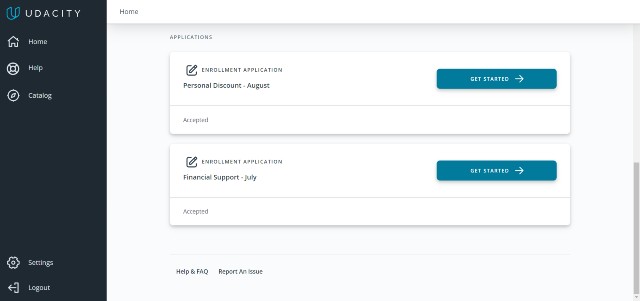
Hence, you will save hundreds of dollars per month. You may spend only $100 or even lower each month on this excellent program.
Many prospective students usually wonder whether Udacity’s program is worth the price. I would say it is.
The timely support Udacity offers alone justifies the price. You can learn a lot more from the industry experts you work with and be confident that you are on the right track.
[sc name=”udacity” ][/sc]Pros and Cons
Pros
- Learn about business analytics from leading business professionals, including business analysts, data scientists, and data analysts.
- Beginner-friendly and well-structured curriculum
- Excellent course materials (quizzes, assignments, and real-world projects)
- Frequently updated, so the course content always helps build job-ready skills
- Timely Mentor Support
- Unlimited Project Reviews
Cons
- More expensive than most business analytics courses available online
- You will need to enroll in other nanodegree programs to develop advanced skill sets, particularly those related to data science or business intelligence.
2. Certified Business Intelligence & Data Analyst (BIDA)™
The BIDA program by the CFI (Corporate Finance Institute) is designed to exclusively prepare students to be ready for a career in business intelligence and data analytics.
If you are looking for a comprehensive program that could build your job-ready skills, this program is unarguably one of the best options you could find.
The program has no prerequisites. Thus, everyone can comfortably start the course right away.
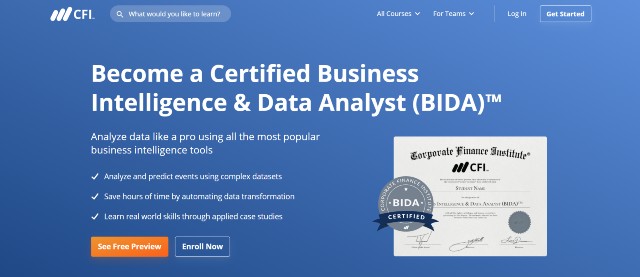
Course Content
The BIDA program is entirely different from the university courses you are familiar with. It will not focus on theories. Instead, you will learn from numerous case studies, which will help build real-world skills in the process.
The program now consists of more than 15 courses, while many more are in the pipeline. All courses can be separated into three groups.
1. Prep Courses – The first group comprises three courses. They will provide basic training that prepares students for more advanced concepts in the core courses.
These three courses are Introduction to Business Intelligence, Data Science Fundamentals, and Statistics Fundamentals.
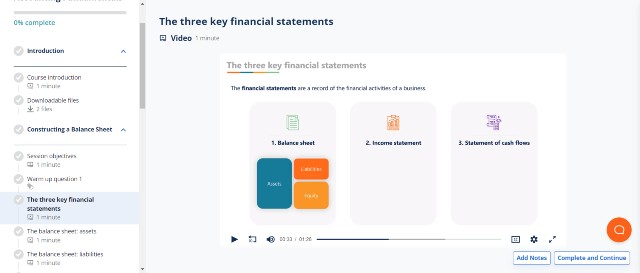
2. Core Courses – Core courses make up a major part of the BIDA program. Currently, there are nine courses and two real-world case studies.
Essentially, you will learn how to use leading business analytics tools professionally, including Power BI, Tableau, and Excel (Power Query and Power Pivot) in-depth.
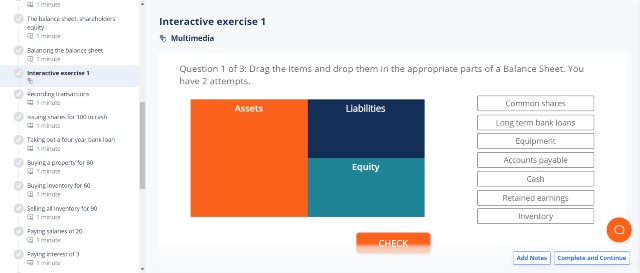
Subsequently, you will then use these tools to perform data-related tasks, including data transformation, data modeling, and data modeling.
Finally, you will learn Python programming, machine learning, and SQL to predict future outcomes. You will understand how to interpret the results from realistic predictive models, which
After you finish all the courses, you will work on case studies.
3. Elective Courses – Elective courses are additional courses that help you strengthen your skills as a business analyst. As of December 2021, most have not yet been released, so there are only two courses in the group: Excel VBA for Finance and Bayesian Thinking.
All the courses in the program have an assessment that will test your skills. You will need to score at least 70% for all. Otherwise, you will not be eligible to take the final exam.
The final exam is the final assessment that will test the knowledge you learn throughout the program. If you manage to score above 70%, you will receive a BIDA certification from the institute.
The entire program is self-paced. Thus, you can handily set your own schedule. Most students complete the program within 150-200 hours of learning.
Pricing
Regarding tuition, the CFI offers two options for this program as follows:
- Self-study – $497 per year
- Full-Immersion – $847 per year
All two options grant access to all existing CFI courses (more than 100 in total), upcoming courses, future updates, and learning materials.
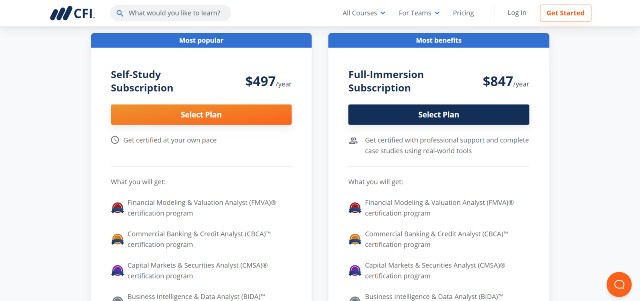
In other words, besides the BIDA program, you can take courses from other programs, including financial modeling (FMVA), capital markets (CMSA), credit analyst (CBCA), and obtain certifications from all four programs in one go.
The full immersion option will provide access to premium tools (Macabacus, Capital IQ, Refinitiv Workspace, Pitchbook, and Vertical IQ) and premium support (Q&A support, model review, and resume & cover letter review)
However, unlike Udacity’s, you cannot send unlimited inquiries or model review requests. You can only ask 5 questions per week and request one model review.
In my opinion, the self-study option is adequate for most students. As the course materials are excellent and equipped with detailed explanations, self-studying would be without hassles.
Hence, you may not need the full immersion option at all.
Still, a full immersion subscription may be a great idea if you need additional assistance from qualified business analysts. You will not need to spend hours searching for answers if you get stuck. Access to premium tools may also be worthwhile.
[sc name=”cfiint” ][/sc]Pros and Cons
Pros
- Solid and comprehensive business intelligence training
- Hands-on approach, focusing on building practical skills for your career, not theories.
- Beginner-friendly and easy-to-follow curriculum
- Robust assessment system (quizzes, exercises, projects, and the final exam)
- Informative and in-depth lessons
- The new subscription plan provides excellent value for money.
Cons
- CFI does not offer a monthly subscription. All students need to subscribe annually.
3. Business Analytics Specialization
This Coursera specialization from the University of Pennsylvania (Wharton) is an excellent program for beginners who want to learn to make informed decisions in any business scenario.
You don’t need any background knowledge for this specialization.
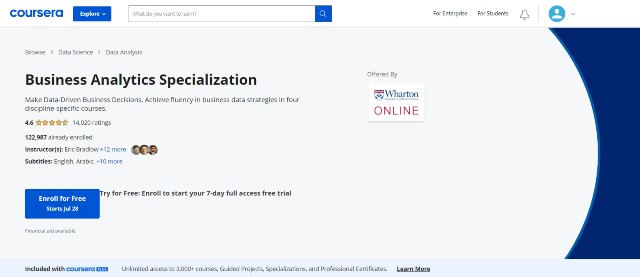
Course Content
The specialization comprises five minor courses as follows:
1. Customer Analytics – The first course will explore the core areas of customer analytics, which include descriptive analytics, predictive analytics, and prescriptive analytics.
Subsequently, you will understand how companies collect customer data and use them for executives to make informed decisions. Furthermore, the instructors will introduce several tools that are used to evaluate and predict customer behavior. You will then be able to select the appropriate tool for specific tasks.
2. Operations Analytics – The second course will explain how to leverage data in business operations. You will understand how to use data to predict policy outcomes or even future demand and supply of the product, so your company can benefit from them.
This course will explore business analytics in various business settings. Hence, it would be beneficial for students of different backgrounds.
3. People Analytics – The third course will discuss how companies can use data to manage human resources, including hiring, promotion, evaluation, and many more.
4. Accounting Analytics – The final course is a deep dive into how businesses can utilize data to forecast future financial performance and generate actionable insights for various business areas in the financial industry.
5. Business Analytics Capstone Project – This capstone project will grant you opportunities to use all the knowledge you obtain from the former courses. You can then design a plan of action to provide actionable insights based on data.
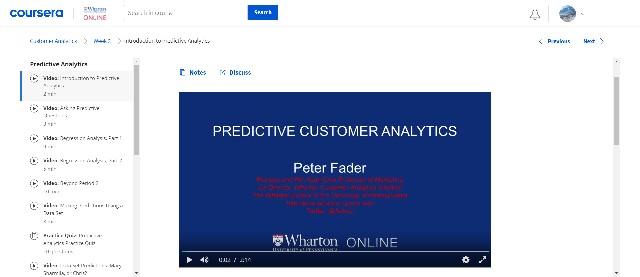
The instructors recommend spending 3 hours a week on the program, and you will complete it in 6 months.
You can audit the entire specialization for free. However, if you want your assignment to be graded and receive feedback on your project, you will need to enroll in the full course and pay $79 per month.
Tip: As the subscription fees are high, if you are interested in the full course, I highly recommend subscribing to Coursera Plus (see below) instead.
Pros and Cons
Pros
- One of the best introductory business analytics courses for executives who want to improve decision making
- Learn from Wharton’s leading marketing professors
- Great explanation on how companies use data in various tasks
- Students can audit the full course for free.
Cons
- Lack of advanced content
- The program focuses on theories, which are not very beneficial in practical skill-building.
- The transcripts are not well-organized. Thus, they are extremely difficult to read.
Coursera Plus
Coursera Plus is a subscription that grants complete access to 3000 courses, specializations, guide projects, and many other resources on the platform.
As the subscription fee is $399 per year or $33.25 per month on average, Coursera Plus is more affordable than subscribing directly to each specialization.
With lower prices and fewer limitations, this makes Coursera Plus a superior alternative that you should consider.
[sc name=”coursera” ][/sc]4. Business Analytics for Data-Driven Decision Making
This edX course by Boston University aims toward executives who want to make informed decisions based on data. Upon completion, you will be comfortable performing data analysis of your own or managing a team of data analysts effectively.
This course has no prerequisites, but you need a Power BI desktop to work on assignments and projects.
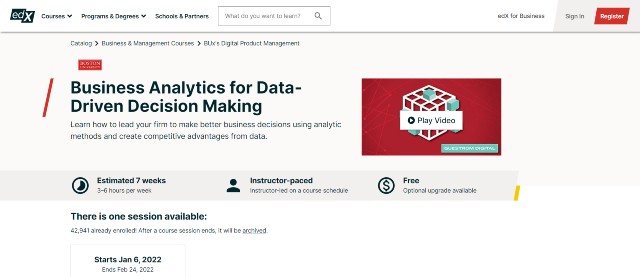
Course Content
This course aims to train you to become an “evidence-based” manager who makes business decisions on data. Below are topics that you will learn from the course.
- Reframing business question as a data question
- Data Collection
- Data Preprocessing and Data Analysis (Predictive modeling, machine learning, etc.)
- How to generate insights and make informed business decisions to improve business performance
- Building a data-oriented business culture
- Creating competitive advantages from enterprise data
From an overall perspective, this course is excellent in that it features all topics that every data-oriented manager should understand by heart.
The instructors will explain the concepts and the implementation processes in detail. Students will then be able to use the knowledge immediately after finishing the course.
You can audit the entire course for free. However, the verified track, which includes graded assignments and a certificate, costs $399 one-time.
According to edX, students will spend 3-6 hours per week for seven weeks completing the course. However, as this course is instructor-paced, you cannot set your own schedule. Hence, it is crucial to ensure that you are not too busy to fulfill all course requirements before enrolling.
Pros and Cons
Pros
- Unarguably one of the best business analytics courses for managers and executives.
- Well-structured curriculum
- Cover both theories and applications
- Learn from leading instructors from a renowned university
- Free auditing
Cons
- Require Power BI Desktop, which is currently not available for macOS.
- This course is instructor-paced. Thus, it may not be suitable for students with busy schedules.
- This course may not be available during certain parts of the year.
5. Leading Digital and Data Decision Making
This edX course from Arizona State University is another fascinating option for executives interested in learning to make use of data and the digital ecosystem to streamline decision-making.
You need no background knowledge for the course.
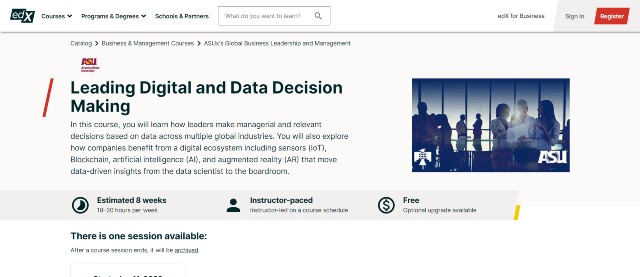
Course Content
In essence, this course will explain how managers can use data and the rising digital ecosystem to enhance decision-making and leadership. Below is a summary of the topics that you will learn in the course.
- Data and statistical methods that you can use to make data-driven decisions for your own business
- How companies understand customers through data analytics and digital ecosystem
- Benefits of data visualizations in decision-making
- How data-streaming sensors utilize enterprise data
- Creating leadership and decision-making strategies to prepare for a data-rich business world
In addition, this course approaches business analytics from a marketing and customer relationship perspective. For example, you will learn how companies generate insights from customer journey data.
Regarding tuition, you can audit this course for free. Alternatively, the verified track costs $299 one-time.
Similar to the fourth course, this one is also instructor-paced. Thus, you cannot set your own schedule. Furthermore, the workload for this course is intense, as most students will need to commit 18-20 hours per week on average.
Consequently, it is even more necessary to check your schedule carefully before enrolling in the verified track. Otherwise, the auditing option may be more suitable.
Pros and Cons
Pros
- Learn business analytics from a marketing and customer relationship perspective, which is excellent for executives who have a background in those fields.
- Informative and in-depth lessons
- Free auditing
Cons
- Inflexible schedule (instructor-paced course)
- Extremely high weekly commitments (not optimal for those with busy schedules)
- Not always available
6. Predictive Analytics using Python
Not available in 2023
If you are looking for a more technical course on business analytics, I highly suggest considering this edX program from the University of Edinburgh.
Within a series of four courses and one capstone project, you will learn insightful predictive analytics techniques and build complex analytical models with Python. Furthermore, you will understand how to apply them to various business scenarios and address business challenges.
Unlike other business analytics courses on this list, this one does have prerequisites. You should be able to code in Python and become familiar with undergraduate-level mathematics and statistics. Machine learning knowledge would also be beneficial.
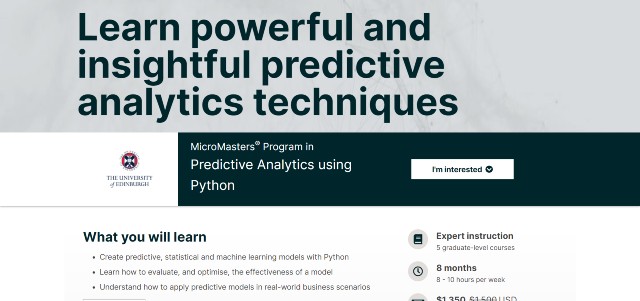
Course Content
This program consists of four minor courses and one project as follows.
1. Introduction to Predictive Analytics using Python – The first course will introduce you to the full lifecycle of the predictive modeling process in Python.
You will first perform data discovery and data transformation and later use the data to build predictive models to generate actionable insights.
2. Successfully Evaluating Predictive Modeling – The second course will deal with model evaluation. You will understand how to evaluate your models appropriately and optimize their accuracy even further.
3. Statistical Predictive Modeling and Applications – The third course will drill deep into three statistical modeling techniques one-by-one. Subsequently, you will apply all techniques to real-world business scenarios and grasp how they can provide solutions to business challenges.
4. Predictive Analytics using Machine Learning – The final course will discuss how to use machine learning to build predictive models. You will use a tree-based approach, neural networks, and Support Vector Machines (SVMs)
5. Final Project – You will use the knowledge you have learned from former courses to work on a project. You will apply different predictive analytics techniques to generate insights and make informed decisions about the current job market needs.
From an overall perspective, the best thing about this program is that you will learn from various real-life examples in every course. These include case studies on customer credit card behavior, sales volume forecasting, and many others.
Hence, you will obtain a significant hands-on experience once you reach the end of the program.
As an instructor-paced program, you will need to spend 8-10 hours weekly on the courses, and you will complete it in 8 months. The weekly commitment is high but still manageable.
The drawback of this program is that it is not always available. During some parts of the year, it will be archived and will not accept new enrollment. You will need to wait until the university announces opening dates.
You can freely audit the entire program. However, as the program has numerous assignments and an interesting final project, I believe selecting the verified track is a much better option.
The verified track costs $1350 one-time and provides access to all courses and learning resources.
Pros and Cons
Pros
- An uber program on predictive analytics one should not miss
- Learn from numerous real-world examples and case studies
- Well-structured curriculum
- In-depth and informative lessons
- Compelling final project
Cons
- The verified track of this program is much more expensive than other alternatives.
- Instructor-paced. You cannot set your own schedule.
- The program is not always available.
7. Marketing Analytics
This course is currently archived. Those who are interested will need to wait for future date announcements.
This edX course by Columbia University trains students to develop quantitative models that can forecast sales and make better marketing decisions.
If you are looking for a “technical” business analytics course that focuses on marketing, I believe this course is among the best you could find.
You will need background knowledge in R or Python programming language along with undergraduate-level statistics, probability, and calculus.
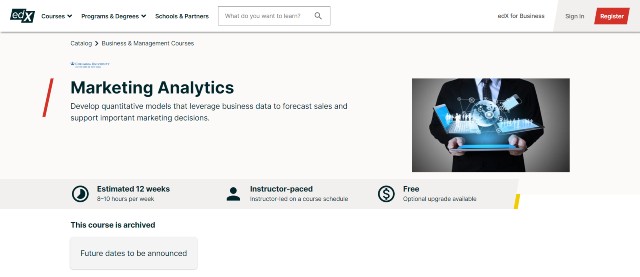
Course Content
Below is a summary of what you will learn from this course.
- Introduction to Marketing Analytics and Customer Analysis
- Forecasting demand using statistical analysis and customer-based models
- Market segmentation and preference measurement
- Calculating the customer lifetime value
- Decisions regarding new product design and product release
- Finding optimal pricing for new products + Pricing Analytics
- Assessing ROI of advertising campaigns
From an overall perspective, you will learn to leverage data to make optimal business decisions on different marketing tasks. Such skill is in demand for any company today.
You should spend 8-10 hours per week on the course and you will complete it in 12 weeks. As an instructor-paced course, you cannot set your own schedule. However, 8 to 10 hours of weekly commitment is more or less manageable.
Similar to other edX courses, you can audit this one without charges. Alternatively, the verified track that provides a complete learning experience costs $249 one-time.
Pros and Cons
Pros
- One of the best online business analytics training for marketing experts
- Learn from leading instructors from a world-renowned university
- In-depth, informative lessons
- Free auditing
- Manageable workload
Cons
- Instructor-paced course
8. Data, Models and Decisions in Business Analytics
This course is currently archived. Please check the course website for future dates announcement.
This course from Columbia University explores fundamental tools and techniques that allow business analysts to leverage data to make better business decisions.
Despite its name, this course is math-heavy. Thus, it is suitable for those who have a solid background in mathematics and statistics. You also need to be familiar with Python and basic programming concepts in procedural programming languages.
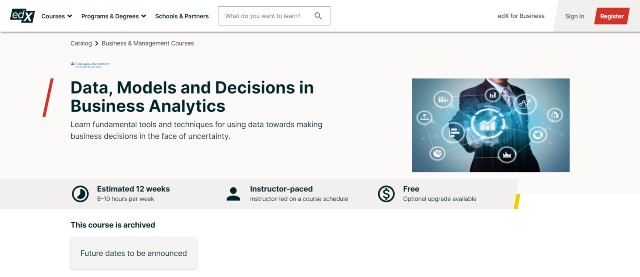
Course Content
Below is a summary of what you will learn from the course.
- Develop decision-making frameworks by utilizing the following concepts: Probability and Statistics, Stochastic Modeling and Optimization
- Use historical data to build quantitative models for decision problems
- Optimize your models using various techniques, including but not limited to linear optimization, non-linear optimization, and dynamic optimization
The content of this course is highly technical. However, the instructors will explain it in the real-world business context, so you can clearly grasp its usefulness.
The estimated time to complete is 12 weeks. As an instructor-paced course, a weekly commitment of 8 to 10 hours is expected.
Auditing is free of charge. However, regarding the nature of this course, I highly recommend selecting the verified track as all assignments and projects will be graded, which should ensure you are on the right track.
Pros and Cons
Pros
- The instructors will present topics in practical business applications context, which is excellent for students to grasp its usefulness in real life.
- Learn from professors from a leading university
- Well-structured curriculum
- Free auditing
Cons
- Instructor-paced course
- Not always available
9. Emeritus Programs
The Emeritus platform offers various business analytics programs from leading universities. These programs will be costlier than those I cover on this list, but you will receive full instructor support and a verified certificate from the university.
However, this does not mean that Emeritus programs are more in-depth than other alternatives. In fact, some even cover much less content than Udacity, CFI, and edX programs.
Below are some of the Emeritus programs for business analytics that you may be interested in.
Imperial Business Analytics: From Data to Decisions – This introductory program from Imperial College Business School will guide you through Python programming fundamentals.
Later on, you will progress to build descriptive, predictive, and prescriptive models to generate insights used for informed decision-making.
Fees: £1,790, but you can save £220 if you click the button below.
Business Analytics: Decision Making Using Data – This program from the University of Cambridge provides insights and techniques for transforming a company into a data-driven one.
Instructors will demonstrate the use of advanced data analytics tools, particularly Tensorflow. However, you will not code in this course.
Fees: $2000
Business Analytics: From Data to Insights – This business analytics program from the University of Pennsylvania will guide you to use data to make informed decisions and formulate better strategies for your businesses, thus suitable for managers and executives.
Fees: $2600, but you can click the button below to save $260
Related Courses
Below are additional lists of online courses that you may want to take further to strengthen your business analytics skills.
Statistics for Data Science – Understanding statistics is vital for learning business analytics, data science, and beyond. If you are unsure whether your existing knowledge is sufficient, I strongly recommend taking one of these statistics for data science courses.
Tableau – An excellent software that is one of the most-used data visualization and data analytics tools.
Taking a Tableau course is particularly helpful if you are interested in a career in business analytics.
Power BI – Another higher popular data visualization software used by companies globally
Python Programming – The programming language used in data science, machine learning, and other related fields.
NumPy and Pandas – The two most used Python libraries for conducting data analysis.
Machine Learning – Machine learning has become an integral part of business analytics. Mastering the subject would enhance your analysis capability significantly.
Data Mining – Coming Soon
Big Data – Coming Soon